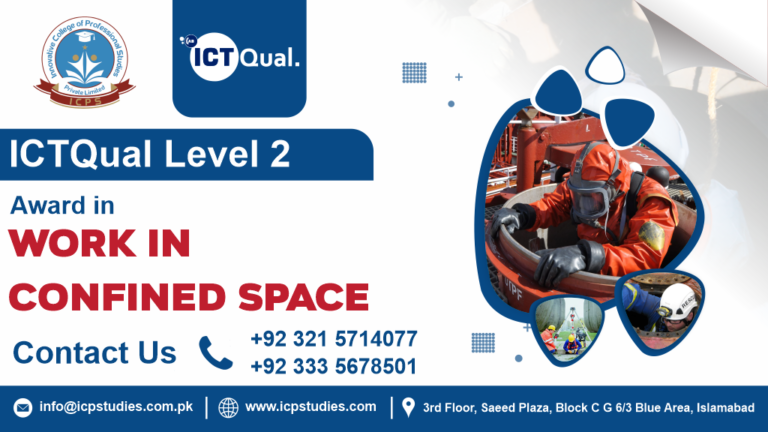Are you looking to pursue a career in Information Technology (IT) Engineering and gain the skills necessary to thrive in the rapidly evolving tech industry? The ICTQual Level 3 Diploma in Information Technology Engineering (60 Credits) is the perfect starting point. This course is designed to provide you with a comprehensive understanding of the essential concepts, techniques, and practices needed to excel in IT engineering roles.
The ICTQual Level 3 Diploma in Information Technology Engineering (60 Credits) is a six-month program designed for individuals who are looking to build a solid foundation in IT engineering. This diploma offers in-depth knowledge and practical skills in key areas such as networking, system architecture, programming, and IT infrastructure. Whether you’re aiming for a role as an IT technician, network engineer, or system administrator, this course equips you with the technical know-how and problem-solving skills needed to succeed in the tech industry.
This Level 3 Diploma is a comprehensive qualification that provides 60 credits of learning in Information Technology Engineering. It covers a broad range of topics essential for anyone wanting to work in IT engineering, including the design, implementation, and maintenance of IT systems. The program consists of theoretical modules combined with practical assessments, ensuring that you not only understand the principles of IT engineering but can also apply them in real-world scenarios.
By the end of this course, you will have the skills and knowledge to take on a variety of roles in the IT sector. Whether you want to manage IT systems, troubleshoot issues, or design solutions for complex technical problems, this course will set you on the path to success.
The ICTQual Level 3 Diploma in Information Technology Engineering offers a unique opportunity to gain a deep understanding of IT engineering principles, while developing the practical skills necessary to succeed in the industry. With an emphasis on hands-on learning, networking, programming, and IT security, this course is ideal for anyone looking to pursue a rewarding career in IT engineering.
Take the next step in your IT career today and enroll in the ICTQual Level 3 Diploma in Information Technology Engineering (60 Credits).
All About ICTQual Level 3 Diploma in Information Technology Engineering 60 Credits – Six Months
Course Overview
The ICTQual Level 3 Diploma in Information Technology Engineering is a comprehensive qualification designed to provide students with essential knowledge and hands-on skills in the dynamic field of IT engineering. This six-month program, worth 60 credits, equips learners with the technical expertise to design, implement, and maintain IT systems and infrastructures, alongside the essential skills needed for career advancement in IT engineering roles.
Throughout the course, students will gain in-depth understanding and practical experience in areas such as networking, system architecture, programming, IT security, and troubleshooting. By combining theoretical learning with real-world applications, this course ensures that you are prepared for a wide range of roles in the IT industry.
Whether you’re aiming to become a Network Engineer, Systems Administrator, or pursue a career in Cybersecurity, this diploma offers the foundational skills and knowledge to help you succeed. Upon completion, graduates will be ready to take on technical challenges in the rapidly evolving world of Information Technology.
Study Units
- Construction Technology and Materials
- Structural Mechanics and Design
- Site Surveying and Geotechnics
- Health, Safety, and Environmental Practices
- Project Management Fundamentals
- Civil Engineering Drawing and CAD
To enroll in the ICTQual Level 3 Diploma in Information Technology Engineering, prospective students must meet the following entry requirements:
- Minimum Age Requirement:
Applicants should be at least 18 years old. - Educational Background:
- A Level 2 qualification in a related field such as Information Technology, Engineering, or Computer Science. This could include a GCSE in IT or a vocational qualification at Level 2.
- Alternatively, relevant work experience in an IT support or engineering role may also be considered for admission.
- Basic IT Knowledge:
A basic understanding of computer systems, hardware, and software is highly recommended. Applicants should be comfortable using common computer applications and navigating operating systems (e.g., Windows, Linux). - English Language Proficiency:
Since the course is delivered in English, applicants should have a good command of the English language. This includes reading, writing, speaking, and listening skills at an appropriate level for academic and professional communication. - Motivation and Commitment:
As the course is intensive and hands-on, students should demonstrate a strong interest in IT engineering and a willingness to engage actively in both theoretical and practical aspects of the program.
If you meet these criteria and are passionate about advancing your career in IT engineering, the ICTQual Level 3 Diploma in Information Technology Engineering is the ideal next step for you.
The ICTQual Level 3 Diploma in Information Technology Engineering (60 Credits) is ideal for individuals who are looking to pursue a career in the rapidly evolving field of IT engineering. This course is suitable for:
- Aspiring IT Professionals:
If you’re looking to start your career in IT engineering, this diploma provides a solid foundation in areas like networking, system design, programming, and IT security, giving you the skills needed to step into entry-level IT engineering roles. - Current IT Technicians or Support Staff:
Professionals working in IT support or technical roles who wish to enhance their skills and gain formal recognition of their expertise can benefit from the comprehensive curriculum, which covers both technical and managerial aspects of IT systems. - School Leavers:
Recent high school graduates with an interest in technology and a desire to pursue a career in IT engineering will find this course an excellent starting point for further education or entering the workforce. - Career Changers:
Individuals from other industries who have a passion for IT and are looking to transition into an IT engineering career will find this course a great way to gain relevant knowledge and skills to make a successful career switch. - IT Enthusiasts with Practical Experience:
If you’ve been working on IT projects or self-learning but lack formal certification, this diploma will help validate your skills and provide you with a structured path to gain more in-depth technical knowledge. - Those Interested in Specializing in Networking, Systems, and Cybersecurity:
Whether you want to design network infrastructures, become a system administrator, or work in IT security, this course provides specialized learning in these key areas, preparing you for roles like Network Engineer, Systems Administrator, or Cybersecurity Specialist.
This diploma is designed to support individuals at various stages of their career who are passionate about IT engineering and eager to acquire the practical and technical skills needed to succeed in the industry.
Learning Outcomes
Below are the key learning outcomes for each study unit in the ICTQual Level 3 Diploma in Civil Engineering (60 Credits) program. Upon successful completion, students will be equipped with essential skills and knowledge to pursue careers in the civil engineering industry.
1. Construction Technology and Materials
Learning Outcomes:
- Understand and explain the properties and uses of common construction materials such as concrete, steel, timber, and composites in civil engineering applications.
- Evaluate the performance of different materials based on criteria like durability, cost, and suitability for specific construction projects.
- Apply modern construction techniques, including advanced material testing methods and new construction technologies.
- Analyze how material choices affect the sustainability and efficiency of construction projects.
2. Structural Mechanics and Design
Learning Outcomes:
- Apply core principles of structural mechanics to assess how various forces (tension, compression, shear, bending) impact structures.
- Calculate load-bearing capacities of key structural components, including beams, columns, and foundations, factoring in live and dead loads as well as environmental forces.
- Design simple structural systems according to industry standards, ensuring both safety and efficiency in the construction of buildings and infrastructure.
- Evaluate the stability of structures and propose strategies to mitigate potential risks and weaknesses.
3. Site Surveying and Geotechnics
Learning Outcomes:
- Use surveying instruments (total stations, levels, GPS) to accurately collect and analyze site data.
- Interpret topographical maps and site plans to support engineering decision-making and project planning.
- Assess soil properties such as compaction, type, and bearing capacity to determine the suitability of foundations.
- Apply geotechnical principles to evaluate site conditions and recommend appropriate foundation types and soil treatments.
4. Health, Safety, and Environmental Practices
Learning Outcomes:
- Understand and apply construction safety regulations to ensure the protection of workers and the public.
- Implement effective risk management strategies to minimize hazards on construction sites, in compliance with local and international safety standards.
- Promote sustainable practices within civil engineering projects by assessing environmental impacts and suggesting appropriate mitigation strategies.
- Apply environmental laws and guidelines to reduce the ecological footprint of civil engineering projects.
5. Project Management Fundamentals
Learning Outcomes:
- Utilize fundamental project management techniques to plan, execute, and monitor civil engineering projects efficiently.
- Develop project timelines, allocate resources (labor, materials, equipment), and ensure adherence to budgets and deadlines.
- Monitor project costs and manage financial aspects through techniques like cost estimation, budgeting, and expense control.
- Assess risks throughout the project lifecycle and apply mitigation strategies to prevent delays and budget overruns.
6. Civil Engineering Drawing and CAD
Learning Outcomes:
- Create accurate technical drawings of civil engineering designs using both traditional methods and modern Computer-Aided Design (CAD) software.
- Interpret and analyze complex engineering plans, recognizing key components, dimensions, and specifications.
- Use CAD tools to design, modify, and visualize infrastructure projects such as roads, bridges, and drainage systems.
- Generate detailed design documentation that can be utilized for planning, permits, and construction purposes.
These learning outcomes ensure that graduates of the ICTQual Level 3 Diploma in Civil Engineering will possess the practical and technical skills necessary to thrive in the civil engineering field. From understanding construction materials to applying advanced design techniques and project management skills, students will be well-prepared to enter the workforce and contribute to major civil engineering projects
FAQs about ICTQual Level 3 Diploma in Information Technology Engineering 60 Credits – Six Months







